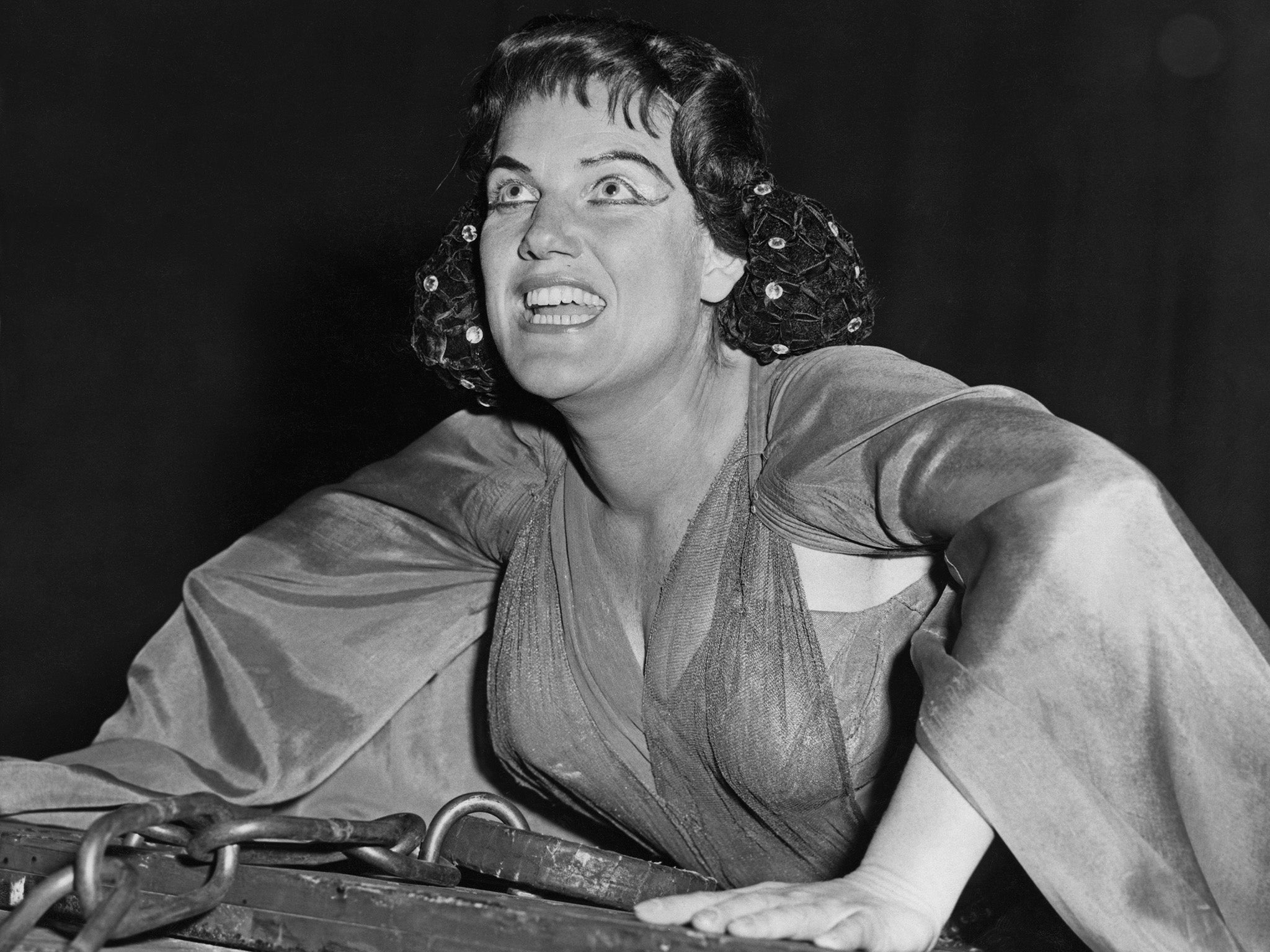Inge Borkh: opera singer who became a star of the stage in postwar Germany as Elektra and Salome
With a powerful voice and commanding stage presence, she triumphed in portraying any number of tempestuous operatic heroines

Combining a rare musical insight with remarkable resilience, the soprano, Inge Borkh, who has died aged 101, was one of the leading European opera singers to emerge in the immediate post-war era.
Able to combine a powerful yet flexible vocal range with a glamorous and commanding stage presence, she particularly triumphed in portraying any number of tempestuous operatic heroines, of whom Beethoven’s Leonora and Puccini’s Turandot, together with Richard Strauss’s Electra and Salome, brought her enduring worldwide renown.
Though she often shaved four years off her real age, Ingeborg Simon was born in Mannheim in the latter years of the Great War. The daughter of a distinguished Swiss diplomat and an Austrian soprano, the family left Germany for Vienna in 1933. There, having studied both drama and dance at the Max Reinhardt Seminary and Vienna Academy, she initially made her name in legitimate theatre. She then retrained as a singer, studying first with Muratti at the Milan Conservatoire before moving to Salzburg to further refine her vocal technique at the Mozarteum.
By now having changed her name to Inge Borkh, she made her operatic debut in Johann Strauss’ Die Zigeunerbaron (The Gypsy Baron) in Lucerne in 1940. Performing with them for four years, she then moved to Berne staying until 1951.
That year, she consolidated her growing reputation when portraying Magda Sorel in the German-language premiere of Gian Carlo Menotti’s opera, The Consul. Twelve months later, having appeared twice at Bayreuth, first as Sieglinde in Die Walküre and then Freia in Das Rheingold, she then went on to undertake numerous leading roles at all of the major European opera houses.
When a member of the Hamburg State Opera Company, she made her first appearance in this country at the 1952 Edinburgh International Festival. She returned six years later, but now with the Stuttgart State Opera Company. In the interim, she had made her London debut, again with the same company, playing Strauss’s Elektra at the Royal Festival Hall.
Having first appeared at Covent Garden as Salome in 1959, 12 years later, despite being hospitalised during rehearsals, she famously triumphed in the same composer’s, Die Frau Ohne Schatten, conducted by Georg Solti.
Borkh had made her American operatic debut starring as Elektra in the San Francisco Opera Company’s 1953 production, again with Solti conducting. She sang the first of her six highly praised Salomes under Dimitri Mitropoulos at the Met in January, 1958. Her time there also included a couple of Sieglindes, before Elektra followed in 1961. She returned 10 years later to alternate with Christina Ludwig as the Dyer’s wife. She also appeared in Chicago, Los Angeles, Philadelphia, Buffalo and New Orleans. In 1956, she played Elizabeth I in the US premiere of Benjamin Britten’s Gloriana.
While spending increasing amounts of time across the Atlantic, she enjoyed no less success in the concert hall. Amid engagements at Carnegie Hall, she was a soloist in Beethoven’s “Ninth Symphony” in the company of William Steinberg and the Pittsburgh Symphony Orchestra, she performed Massenet with the Cincinnati Symphony Orchestra and often appeared as Leonora alfresco at park concerts. Contributing also to telecasts expounding the virtues of Igor Stravinsky in the company of Leonard Bernstein, her growing celebrity status saw her profiled in Vogue magazine.
Acknowledged as a noted exponent of 20th century operatic output, as such her performances included the 1955 Salzburg Festival production of Werner Egk’s, Irische Legende, Ernest Bloch’s Lady Macbeth, Carl Orff’s Antigone and Louise Talma and Thornton Wilder’s Alcestis, heard for the first time in a German version in 1962. Borkh, whose father was Jewish, also starred in Israeli composer, Joseph Tal’s opera, Ashmedai.
Its Hamburg premiere in 1971, came exactly 33 years after Kristallnacht, when the Nazis destroyed the vast majority of Germany’s synagogues.
Happily, many of Borkh’s pioneering performances endure courtesy of an extensive and richly varied discography. Of her numerous Strauss recordings, perhaps the most vivid is her 1958 appearance at the Met with Dimitri Mitropoulos.
There is also her famous recording of the final scene from Salome in the company of Fritz Reiner’s Chicago Symphony Orchestra, her partnership with Dietrich Fischer-Dieskau in Die Frau ohne Schatten and, not least, her highly distinctive cabaret act. Here again, her sensitivity to nuance and colour allows her to take great delight in her occasional grand gesture.
Her final operatic outing was as Elektra in Palermo in 1973. Later, following the sudden death of actress Elisabeth Flickenschildt, Borkh returned to the stage to take over her role as Volumia in a Hamburg production of William Shakespeare’s Coriolanus.
Further acting roles followed before she turned chanteuse, creating her own highly distinctive cabaret act. In demand as a jurist at international competitions, her talents also found a ready outlet at seminars, workshops and master classes worldwide. An autobiography entitled, Ich Komm vom Theater Nicht Loss, appeared in 1996.
Twice married, her second husband, the distinguished Yugoslav bass, Alexander Welitsch, died in 1991.
Inge Borkh, opera singer, born 26 May 1917, died 26 August 2018
Join our commenting forum
Join thought-provoking conversations, follow other Independent readers and see their replies
Comments
Bookmark popover
Removed from bookmarks